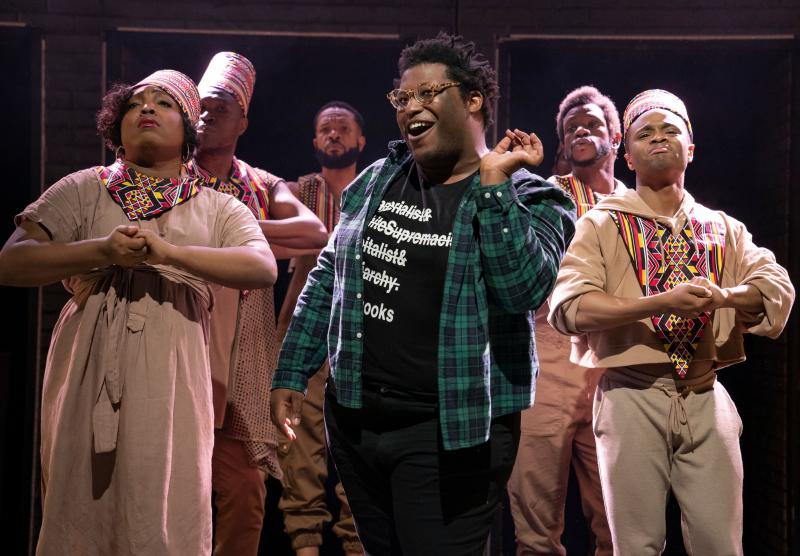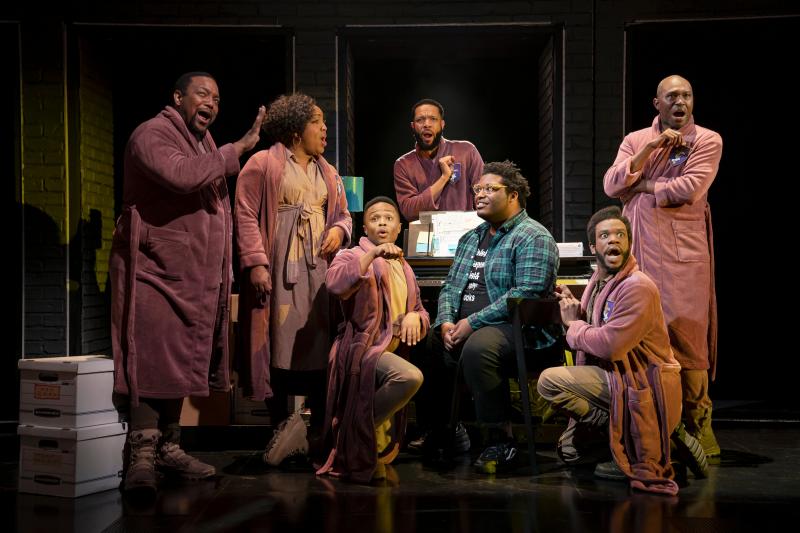Review: Michael R. Jackson's Clever and Tuneful A STRANGE LOOP Zeros In On The Exclusive Side of Inclusiveness
"Don't roll your eyes at me," a person of influence instructs a promising young musical theatre writer. "I'm the chair of the Second-Coming-Of-Sondheim Award so I know what the fuck I'm talking about!"

Larry Owens, Antwayn Hopper and John-Michael Lyles
(Photo: Joan Marcus)
The difference between letting your underrepresented voice be heard and saying what the powers that be want to hear from your particular underrepresented voice is what often separates exciting emerging theatre artists who receive grants, residencies and Off-Broadway productions from their equally exciting emerging colleagues who beg friends to help them meet the audience minimums so they can play a couple of songs from their unproduced musicals at cabaret showcases and urge social media mavens to like and share YouTube videos of their performances between survival job shifts.
The exclusive side of inclusiveness is one of the issues that travels through the crowded mind of Usher, the composer/lyricist/bookwriter at the center of composer/lyricist/bookwriter Michael R. Jackson's clever, tuneful and gloriously neurotic mix of self-exploration and social commentary, A Strange Loop, which is receiving a sharp and funny premiere production via Playwrights Horizons and Page 73.
Like the author who created him, Usher (played with a terrific mix of sparkling showmanship and engaging honesty by Larry Owens) not only shares a name with a far more famous music star, but, as Jackson once did, he works as a Broadway usher at THE LION KING while trying to get producers interested in his brand of "big, black and queer-ass American Broadway."
"Every time you present to our Guardians of Musical Theatre Centrism Tribunal I find myself longing for the days when musicals were quieter and more centered around the lives and concerns of civilized, property-owning adults," says one haughty rejector.
"Why not make it be about slavery or police violence so the allies in your audience have something intersectional to hold onto?," suggests someone who appears to be on the edge of saying that his work isn't black enough.
And then there's Usher's mother, who rejects his homosexuality and wishes he would write something family-oriented and spiritual like Tyler Perry. ("His plays are worse for black people than dia-fuckin-betes," Usher retorts.)
As penned by Jackson, Usher's musical voice tends to be an extension of what he calls his "inner white girl," featuring bouncy and energetic theatre-pop melodies propelling lyrics infused with enough wittily-expressed angst to fill another William Finn trilogy. ("White girls can do anything, can't they? Black boys must always obey their mothers," he sings.)
Director Stephen Brackett and choreographer Raja Feather Kelly smoothly and seamlessly guide a talented sextet of actors (Antwayn Hopper, L. Morgan Lee, James Jackson Jr., John-Michael Lyles, John-Andrew Morrison and Jason Veasey) in and out of Usher's consciousness, playing what Jackson designates as "thoughts," but recognizable as simply the people in his life. They both echo and torment Usher through the author's thickly-textured vocal arrangements.
The bulk of the continuous 100-minute piece darts around topics such as Usher's lack of a sex life ("I average about one penetration every two or so years."), his father's attempt to steer him towards making money ("I don't know if you know who Scott Rudin is / But I read that even his balls are dipped in pure gold.") and an encounter with a cute guy on the subway who seems truly interested in why the musical he's working on is titled A Strange Loop, but the epiphany is reached through an offer to earn a lot of money by ghostwriting a Tyler Perry gospel play.

John-Michael Lyles, Jason Veasey, Larry Owens,
Antwayn Hopper and James Jackson, Jr.
(Photo: Joan Marcus)
Though it seems like easy money ("Just write a sassy matriarch, a lonely spinster who loves God; throw in a few "Color Purple" quotes, whaddaya say?") it takes the spirits of Harriet Tubman, Zora Neale Hurston, Whitney Houston and other black ancestors to convince him to take the gig.
Of course, Usher does it his way, and the audience witnesses his mind's creation; a stinging musical statement criticizing the limited ways he sees black audiences accepting portrayals of themselves.
Musicals about people who write musicals are nothing new, but 21st Century American theatre's growing inclusiveness is, and the freshness that A Strange Loop offers comes in its protagonist's duel-struggle of not just being an underrepresented voice but being an underrepresented voice within his major subset of underrepresentation. Finding yourself is the easy part. Finding your self that others want to discover is where it gets tricky.


